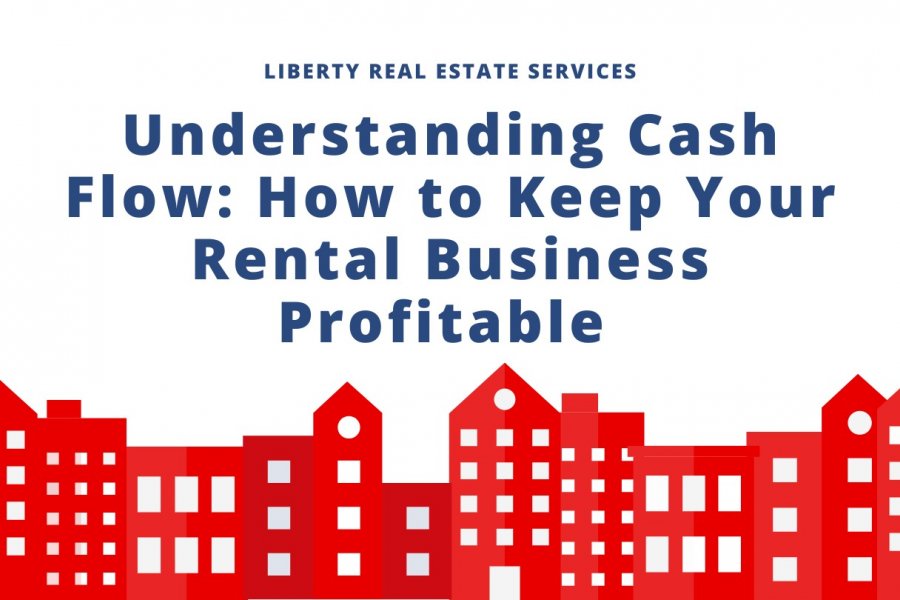
- Cash flow is the heartbeat of your rental business and drives growth, stability, and long-term profitability.
- Tracking income, controlling expenses, minimizing vacancies, and exploring additional revenue keeps cash flow strong.
- Hiring Liberty Real Estate Services for property management improves efficiency, protects cash flow, and supports sustained investment success.
At Liberty Real Estate Services, we know that in rental property investing, cash flow is not just a number; it's the heartbeat of your business. Understanding cash flow and other key real estate investing terms is crucial for investors.
In this article, we help you learn the essentials of rental cash flow, how to analyze and improve it, and provide practical steps to ensure your rental business remains profitable and sustainable.
Learn How We Can Help You Maximize Your Home’s Potential!
What Is Rental Cash Flow?
At its simplest, cash flow is the total money coming in from your rental property minus the total money going out. On the income side, this includes rent and any additional revenue such as parking fees, laundry income, or storage charges.
On the expense side, you'll deal with mortgage payments, insurance, taxes, maintenance, property management fees, and utilities, among other costs.
A positive cash flow means that your rental generates more income than it costs to operate. Conversely, negative cash flow signals you're losing money each month. The importance of this metric cannot be overstated: without positive cash flow, your investment may struggle to sustain itself, let alone deliver profit.
A useful way to measure performance is through cash-on-cash return, which compares your annual before-tax cash flow to your initial cash investment. For instance, if your property nets $12,000 annually and your initial investment was $100,000, your cash-on-cash return is 12%.
This metric provides insight into your return relative to your out-of-pocket expense and helps you compare different investment options more effectively.

Why Cash Flow Matters
Cash flow supports your real estate investment in key ways:
- Day-to-day liquidity: Covers maintenance, emergencies, or vacancies, preventing costly surprises.
- Reinvestment potential: Positive cash flow allows you to acquire additional properties and grow your portfolio.
- Equity growth: Consistent returns build long-term equity as tenants pay down the mortgage and property values appreciate.
- Business mindset: Successful investors treat rentals like businesses. They run cash-on-cash calculations, adjust pricing, and refine forecasts.
The Benchmarks: What’s Considered “Good”?
Industry benchmarks vary, but a few practical guidelines can help you gauge performance. A widely used rule of thumb is the “1% rule,” which suggests the monthly rent should be at least 1% of the purchase price to stand a good chance of covering expenses.
For example, on a $200,000 property, you’d want at least $2,000 in rent. This is a screening tool rather than a guarantee, but it's a good starting point.
Annual cash flow expectations also vary. Some investors look for at least 10% of the property cost annually in positive cash flow. If your cash-on-cash return is between 7% to 8%, you’re around average; aiming for 15% or more positions you in the higher-performing tier.
Discover the Benefits of Partnering With Us!
Calculating Cash Flow: A Step-by-Step Guide
To properly assess any investment, follow this structured approach:
1. Estimate Gross Income: Add up expected rent and any additional revenue streams like pet fees, parking, or laundry.
2. Account for Operating Expenses: List all your projected costs: mortgage, property taxes, insurance, maintenance, vacancy allowances, utilities, and mandatory reserves.
3. Derive Net Operating Income (NOI): Subtract operating expenses from gross income. Note that this figure excludes debt service.
4. Subtract Debt Service: Remove your mortgage payments (principal and interest) from NOI to arrive at net cash flow.
5. Calculate Cash-on-Cash Return: Divide the annual net cash flow by your initial cash investment to evaluate return efficiency.

Strategies to Sustain and Improve Cash Flow
1. Track Income and Expenses
Stability and growth in a rental business depend on proactive strategies. Maintaining rigorous tracking of income and expenses allows you to spot financial trends, identify potential issues early, and make informed decisions about your property’s future.
2. Use Tools for Budgeting and Planning
Using software tools or spreadsheets helps you budget effectively and project future performance. Analyzing historical data allows you to anticipate rent adjustments, plan for property replacements, and schedule renovations at the right time. This planning ensures your financial outlook remains stable even as market conditions shift.
Learn More About Our Company!
3. Minimize Vacancy and Turnover
Encouraging lease renewals and focusing on tenant retention reduces the risk of lost income and creates long-term stability.
4. Explore Additional Revenue Opportunities
Offering parking spaces, storage units, or popular amenities can add new layers of income to support cash flow.
5. Maintain Competitive Pricing
Keeping rental rates aligned with local demand while maximizing value ensures competitiveness without leaving money on the table. Negotiating service contracts and controlling vendor costs also protects your bottom line over time.
6. Build an Emergency Reserve
Setting aside funds for unexpected expenses, such as sudden repairs or temporary vacancies, shields your business from costly disruptions and helps preserve consistent profitability.

The Role of Professional Property Management
Engaging a professional property management company brings clarity, efficiency, and peace of mind. They handle the day-to-day tasks so you can focus on growing your investment.
- Clarity and efficiency: Handles rent collection, tenant screening, maintenance, and accounting.
- Reduced vacancies and timely rent: Ensures rent is collected on time and tenant issues are resolved quickly.
- Financial oversight: Monitors trends, flags risks, produces reports, and keeps you organized.
- Regulatory compliance: Ensures leases and operations meet local laws and standards.
- Cost savings and marketing: Access to vendor networks reduces maintenance costs, and marketing tools promote your property effectively.
With a skilled property manager, reactive maintenance becomes proactive asset care, protecting cash flow and supporting long-term growth.
Discover Our Property Management Services!
Bottom Line
Cash flow is the lifeline of your rental business. It fuels growth, absorbs shocks, and sustains profitability. Mastering calculation, understanding benchmarks, and applying smart strategies are key, but hiring Liberty Real Estate Services for all your property management needs can take your cash flow to the next level.
Keep your records clean, your budgets forward-looking, and your revenue streams diversified. With Liberty Real Estate Services managing your properties efficiently, cash flow remains consistent, turning every property into a reliable partner in long-term wealth-building.
